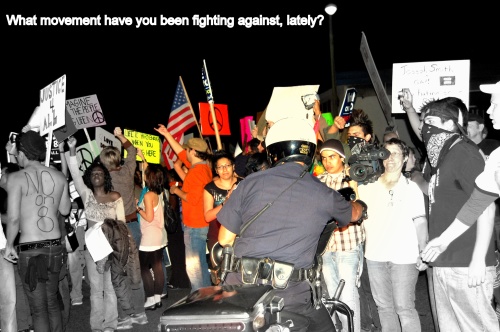
Posts Tagged ‘Add new tag’
La Lutte
Posted in Photography, tagged Add new tag, Photography on February 25, 2009| 1 Comment »
Will to Knowledge and Power?
Posted in Social Theory, tagged Add new tag, Philosophy on May 15, 2008| Leave a Comment »
“The dogged effort to “denaturalize” gender in this text emerges, I think, from a strong desire both to counter the normative violence implied by ideal morphologies of sex and to uproot the pervasive assumptions about natural or presumptive heterosexuality that are informed by ordinary and academic discourses on sexuality. The writing of this denaturalization was not done simply out of a desire to play with language or prescribe theatrical antics in the place of “real” politics, as some critics have conjectured (as if theatre and politics are always distinct). It was done from a desire to live, to make life possible, and to rethink the possible as such. What would the world have to be like for my uncle to live in the company of family, friends, or extended kinship of some other kind? How much we rethink the ideal morphological constraints upon the human such that those who fail to approximate the norm are not condemned to a death within life?”
-Judith Butler, Gender Trouble
Judith Butler in Gender Trouble draws upon numerous French intellectuals to formulate a poststructuralist argument about the “performativity” of gender. Judith Butler and the work is heavily influenced by Michel Foucault as she applies Foucault’s notion of “regulative discourses” from Discipline and Punish to the discourses and control mechanisms exhibited by gender norms and performance (Butler does not blindly obey Foucaultian tradition as she also criticizes him later in the book).
This excerpt from her second preface in 1999 is a simple and excellent demonstration of the practical effect Foucault’s discussion on discourse has. For many, Foucault’s concept of “discourse” as the ultimate, systematic force in society that constructs subjects is difficult to grasp and even harder to understand as having a profound implication upon our lives. It is easy for many, when first approaching Foucault, to criticize what appears to be a relentless and unapproachable philosophy that questions everything. Foucault’s detailed account of the development of discourse historically in books like the History of Sexuality, leaves amateur students of Foucault wondering if discourse and its resulting subjectification of individuals leaves any room for human agency. If discourse creates and controls subjects through power-knowledge mechanisms, do individuals have the ability to not feel as though they are artificially empowered and that they cannot participate in movements for social change and the amelioration of our society? Questions of angst and confusion echo through academic rooms first opening Foucault; “Is it possible to change this overriding discourse?” “Does Foucault propose no solutions?” “Is this complete pessimism?” “Why even engage in this thought if it leads to absolute relativism, disempowering individuals; leaving them with the thought that there is no possibility for societal transformation?”
For myself, these questions are answered in Foucault’s political activism. They are answered in his later more optimistic statements of the intellectual duty to call in question ideas in order to help individuals free themselves from them. But even more concretely, Butler’s personal account of her Uncle’s incarceration due to his “anatomically anomalous body” where he was withdrawn from family and friends in an institute in Kansas and her preceding comments on the meaning and true purpose of her work helps one understand the goals and impacts philosophical inquiry and questioning can have upon society. Butler’s powerful words move me to understand why revolution in academia is vital to the overall intelligence and progress of our society. Butler analyzes discourses that create subjects objectified to power mechanisms (like her Uncle and his incarceration) in order to help bring insight to apparatuses that determine people’s lives in positive and negative ways. Butler describes her intellectual desire as one to “make life possible” for individuals like her Uncle who lived through painful experiences because of the prevalent discourses of anatomy, gender, and sexuality in our society. When these discourses become a science, they are even more dangerous, as Foucault observes the power apparatuses in all forms of life including psychiatry and the legal system. The establishments of norms and the power-knowledge mechanisms that enforce them (driven by a “will-to-knowledge”) are so strong that those who fail to meet these constructions are condemned to a life of difficulty. It is Foucault’s attempt, followed by Butler’s application of “regulative discourses”, to question the history of discourse in deep analysis in order to dismantle its burdening force imposed on every individual who is ruled by it without awareness.
Indeed, it is an intellectual’s duty, to call in question the very notions and language that dictates our contemplations so we are not doomed to repetitively discuss ideas without first placing them into their system of thought. The questioning of established discourses and its subjects presupposes the ability to act and to transform our own society into one which allows all to live within life.
-
Archives
- September 2012 (1)
- December 2009 (1)
- August 2009 (1)
- June 2009 (1)
- May 2009 (2)
- April 2009 (2)
- March 2009 (1)
- February 2009 (6)
- January 2009 (1)
- December 2008 (3)
- November 2008 (4)
- October 2008 (4)
- June 2008 (4)
- May 2008 (3)
- April 2008 (1)
-
Categories
- Creative Writing (8)
- Music (3)
- Photography (4)
- Poetry (7)
- Politics and Political Theory (3)
- Science (1)
- Social Theory (12)
- Uncategorized (2)
-
Pages